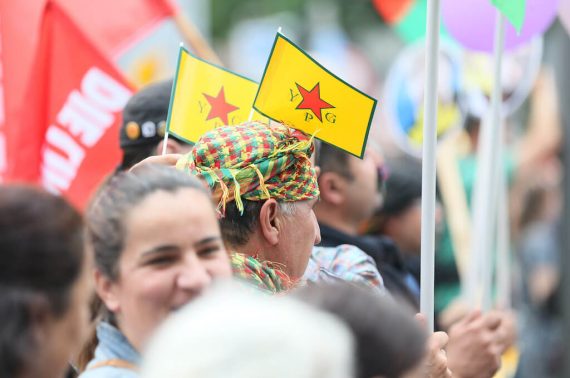“Germany has declared war on the PKK. We can fight back. Every Kurd is a potential suicide bomber.” These words were spoken by Abdullah Öcalan, the founder of the PKK terror group, three years after the group had been banned in Germany due to arson attacks, self-immolations, the blocking of motorways, and storming of Turkish consulates.
However, despite these words, the PKK continued to pursue its double-pronged strategy. In Europe, the terror group focuses on non-violent propaganda work with demonstrations, marches, culture festivals, and various campaigns as well as extorting money and selling drugs to finance its violent terror activities in Turkey, Iraq, and Syria. This dual approach by the PKK to use Europe to attack Turks, Arabs, and Kurds with terror requires a dual counter-terror strategy.
While Turkey, the Kurdistan Regional Government (KRG), and the Syrian Interim Government of the opposition focus more on the militant side of the PKK, Europe has to combat and extinguish the PKK base in Europe that subsidizes the militancy of the PKK with fresh radicalized recruits, funding, and propaganda. Despite the ban of the PKK across European capitals, Europe’s approach to the PKK has always been under the bar of minimum. In recent years, with the growing popularity of the Syrian branch of the PKK – the YPG – the PKK has managed to expand its base in Europe and established strong ties with the far-left.
Weak law enforcement against the PKK – The Case of Germany
According to the German secret service yearly report, the PKK has 14,500 members in Germany alone. However, the number of attendees to its demonstrations in Germany reached 25,000 people. The German intelligence service estimates that 290 people from Germany joined the PKK militants in Turkey, northern Iraq, and Syria since 2013. While 32 of them died during combat, 150 returned to Germany.
In 2020 alone, the PKK has collected at least 16.5 million EURO in Germany
In 2020 alone, the PKK has collected at least 16.5 million EURO in Germany. The total amount of collected money in Europe is estimated to be 30 million EURO. While this happened, the German courts sentenced 3 PKK figures to imprisonment of a period between 2,5 and 3 years.
The European fight against the PKK is symbolized in a recent incident in Germany. According to the report, 90 members of the PKK marched in Lüneburg, Germany, and decided to continue traveling by train. The train crew refused them as they had no tickets and did not abide by the COVID19 safety rules. The PKK members got violent and attacked the crew and the police that were called in. Several criminal proceedings were started against the 90 PKK members, but not on charges of being a member of a terror group or demonstrating in support of it. They were charged with assault and resistance to law enforcement officers.

VIDEO: Exploiting the Female Body: The YPG Case
The Name Game Gave Fruits
While the law enforcement against the PKK is and has been weak not only in Germany but across Europe, a new momentum evolved with the growing popularity of the YPG. The PKK’s name-game in Syria did not only facilitate American support to the PKK but also allowed itself to operate more freely across Europe. The most visible of this new dynamic is in France.
Years ago, the PKK would not even dream of being diplomatically received in the Elysee Palace in France. Thanks to the YPG, the PKK achieved this. The French president Macron invited and received the delegation headed by the political supreme representative body of the YPG – the Syrian Democratic Council. The head of the Syrian Democratic Council, Ilham Ahmed, reportedly met with the French president and was assured of French support to their separatist agenda in Syria. As known, the YPG self-declared the Autonomous Administration in North and East Syria.
The name game allowed the French president to argue that he did not receive a designated terror group and its representatives, but the representative of the Syrian Kurds fighting Daesh. Macron disregarded the crimes committed by the YPG against the Syrian Kurds and the vast spectrum of Syrian Kurds extending from the Syrian Kurdish National Council to the Syria’s Independent Kurdish Association.
More dramatically, leaks show that Macron received a designated terrorist. Recent leaks by a Belgian journalist prove that Ilham Ahmed is a PKK veteran. An interviewee provided the Belgian journalist Hedwig Kuijpers with a picture of Ilham Ahmed during her days in a PKK academy in northern Iraq estimated to date between 2007 and 2009.
The PKK did not only exploit the situation in Syria but also used it to expand its ties with the European far-left.
The new momentum gained by the PKK thanks to the name game allowed the terror group to increase its propaganda activities and network across European capitals. The YPG under the name of the Syrian Democratic Council or others opened several political bureaus and engaged in several diplomatic relations.
European Leftists Support the PKK
The PKK did not only exploit the situation in Syria to gain diplomatic and political opportunities but also used it to expand its relations and ties with the European far-left. An internal EU policy paper by the office of EU Counter-Terrorism Coordinator Gilles de Kerchove, released by non-profit monitoring group Statewatch, showed that the EU’s anti-terror chief has expressed concern over strengthening ties between European extreme leftists and the YPG/PKK terrorist organization have recently been getting stronger.
Recommended
Many western radical leftists joined the ranks of the YPG in Syria and have become propaganda tools of the PKK that advocate for the ‘leftist utopia’ in Syria. The implementation of democratic confederalism – a radical governance model of Murray Bookchin – was a strong part of Abdullah Öcalan’s terror agenda. While Syrians suffer under this totalitarian governance model, the idea is gaining popularity among the European left.
The PKK actively instrumentalize the support of radical leftists and western militants who joined its ranks in Syria to gather support for itself. This support ranges from propaganda to parliamentary members demanding the delisting of a terror group that killed over 40,000 people. Most importantly, the European left support for the PKK allows the terror group to access entirely new capital and resources to boost its terror activities.
The PKK now can use the western leftist white men for its interest. The PKK exploits the radical left to strengthen its base in Europe towards European governments and officials as well as towards the Kurds. The PKK plays the radical European leftist also against Kurdish rivals. For instance, when the PKK attacked the Kurdish Peshmerga forces in northern Iraq, radical leftists tried to enter the region and demonstrate in northern Iraq against the Kurdistan Regional Government (KRG). This attempt was prevented by the Kurdish authorities who denied these radical leftists entry to the country.
After the peak of the PKK in the period between 2014 and 2018, the terror group suffered a blowback after the other. The joint Turkish-Syrian military operations, as well as the Kurdish cooperation with Turkey in northern Iraq, drew the PKK back. As I wrote in an earlier article, a de-facto unnamed regional alliance of Turks, Kurds, and Arabs was formed against the PKK.
The Turkish government, the Kurdish Regional Government, and the Syrian Interim Government are trying to end the terror of the PKK. While this happens, the PKK’s base in Europe gives the terror group a lifeline. The lack of law enforcement against the PKK, the fruits of the name-game of the PKK, and the European leftists support are what will keep the terror group alive. In contrast to the American unreliable support, the base of the PKK in Europe is more stable and has the potential.
If the U.S. pulls out of Syria as it did in Afghanistan, it may affect the PKK greatly, but Europe guarantees that the PKK will continue to live. Europe needs to address its wrongdoings in combatting terrorism. Otherwise, the terror of the PKK may take the lives of many more innocent Turks, Kurds, and Arabs.





